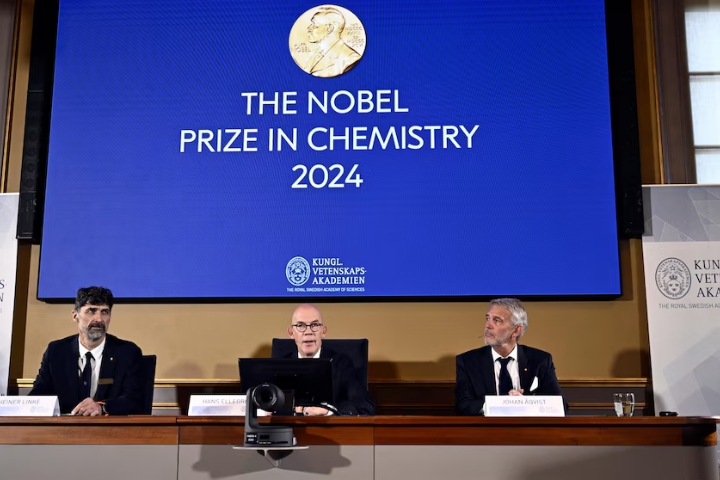The Royal Swedish Academy of Sciences has announced the winners of the 2024 Nobel Prize in Chemistry, recognizing groundbreaking advancements in protein science. David Baker will receive half of the prize for his pioneering work in computational protein design, while the other half will be jointly awarded to Demis Hassabis and John M. Jumper for their innovative contributions to protein structure prediction. This prestigious award highlights the significance of proteins as essential components of life and the ongoing research that continues to unlock their mysteries.
The Importance of Proteins
Proteins are fundamental to all living organisms, playing crucial roles in various biological processes. They are made up of long chains of amino acids that fold into specific three-dimensional structures, determining their function within cells. The ability to design new proteins and predict their structures can lead to significant advancements in medicine, biotechnology, and environmental science.
According to a report by the Nobel Committee, “Proteins are life’s ingenious chemical tools,” emphasizing their versatility and importance in biochemical reactions. Understanding how proteins function is vital for developing new therapies and treatments for diseases.
David Baker’s Contribution: Computational Protein Design
David Baker, a professor at the University of Washington, has made significant strides in computational protein design. His research focuses on creating entirely new proteins that do not exist in nature. By utilizing advanced algorithms and computer simulations, Baker’s team has developed methods to design proteins with specific functions, such as those used in pharmaceuticals and vaccines.
In 2003, Baker successfully created a novel protein that was unlike any previously known. Since then, his group has produced numerous innovative designs, including proteins that can act as sensors or nanomaterials. His work has opened up vast possibilities for applications in medicine and environmental science.
Demis Hassabis and John M. Jumper: Revolutionizing Protein Structure Prediction
Demis Hassabis and John M. Jumper, both affiliated with Google DeepMind, have made groundbreaking advancements in predicting protein structures using artificial intelligence (AI). Their development of AlphaFold2 represents a monumental leap forward in solving a 50-year-old problem: accurately predicting how amino acid sequences fold into functional protein structures.
The AlphaFold2 model has been able to predict the structures of nearly all known proteins with remarkable accuracy. Since its release, it has been utilized by researchers worldwide to better understand various biological processes, including antibiotic resistance and enzyme functions. This AI-driven approach has transformed the field of structural biology, making it easier for scientists to study proteins at an unprecedented scale.
Implications for Future Research
The contributions of Baker, Hassabis, and Jumper have far-reaching implications for various fields. Understanding protein structures can facilitate drug discovery by identifying potential targets for new medications. Additionally, engineered proteins can be designed to tackle pressing global issues such as climate change through bioremediation or sustainable energy solutions.
As noted by Heiner Linke, Chair of the Nobel Committee for Chemistry, “Both discoveries open up vast possibilities,” underscoring the transformative potential of this research.
A Celebration of Innovation
The awarding of the 2024 Nobel Prize in Chemistry marks a significant milestone in our understanding of proteins and their applications. As researchers continue to explore the complexities of these biological molecules, the work of David Baker, Demis Hassabis, and John M. Jumper serves as an inspiration for future innovations.
This recognition not only honors their individual contributions but also highlights the collaborative nature of scientific discovery. As we look ahead, the advancements made in computational design and structure prediction promise to revolutionize our approach to biology and medicine, paving the way for a healthier future.




GIPHY App Key not set. Please check settings